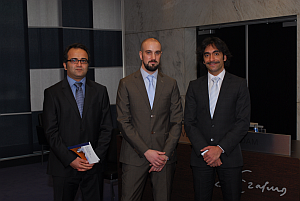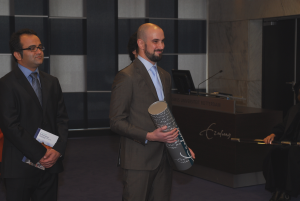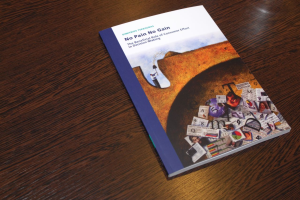PhD Defence: The Beneficial Role of Consumer Effort in Decision-Making
 With the rise of online channels, consumers have the opportunity to access a great amount of sources before making a decision. In his PhD dissertation entitled <link events detail _blank>No Pain No Gain: The Beneficial Role of Consumer Effort in Decision-Making, Dimitrios Tsekouras studies the role of consumer effort within the context of online decision making.
With the rise of online channels, consumers have the opportunity to access a great amount of sources before making a decision. In his PhD dissertation entitled <link events detail _blank>No Pain No Gain: The Beneficial Role of Consumer Effort in Decision-Making, Dimitrios Tsekouras studies the role of consumer effort within the context of online decision making.
In Dimitrios’ first study, it is suggested that user effort reduction in a content-based website (i.e. a health portal) has opposing effects. When reducing information-based user effort (by decreasing the size of the content), beneficial behavioural outcomes like positive website evaluation and revisit intentions are prevailing. However, when focusing on interaction-based user effort reduction (by decreasing the involvement of users in the process), these outcomes are negative. Tsekouras shows that the opposing findings can be attributed to the mediating role of content learning.
In his second study, Dimitrios Tsekouras uses the complexity of the composition of the recommended choice set as a source of consumer effort. He proposes that greater complexity (through increasing consumer effort) increases objective consumer knowledge due to greater required cognitive elaboration but decreases choice confidence and subjective product knowledge. He validates that these effects on product knowledge are managerially meaningful due to their positive effect on website conversion and consumer willingness to pay.
In the third study, Tsekouras examines the role of time as a measure of consumer effort in the context of online product recommendations.
An improved understanding of how consumer effort can affect the success and performance of a website is critical for online firms. Dimitrios’ findings on the differential effects of consumer effort on various behavioral outputs underline the conclusion that the emerging issue in question is not whether to reduce consumer effort or not, but rather how to reduce it.
<link people dimitrios-tsekouras _blank>Dimitrios Tsekouras defended his dissertation on 13 November 2012. His supervisor was Professor Benedict Dellaert. Other members of the Doctoral Committee were Professor Bas Donkers (Erasmus School of Economics), Professor Eric van Heck (Rotterdam School of Business), and Dr Zhenhui Jiang (NUS Business School).
About Dimitrios Tsekouras
 Dimitrios was born in Amarousion (Greece) on 26 March 1981. He obtained his bachelor degree in Business Administration in Athens University of Economics & Business in 2003. After finishing his undergraduate studies, Dimitrios worked in the marketing department in food and movie distribution industry in Greece. In 2006 he completed his master’s degree in Marketing at the Erasmus University and started as a Ph.D. candidate in the marketing department at the Erasmus School of Economics. During his PhD, Dimitrios taught Marketing (for Bachelor) and Consumer Channel Dynamics (for Master).
Dimitrios was born in Amarousion (Greece) on 26 March 1981. He obtained his bachelor degree in Business Administration in Athens University of Economics & Business in 2003. After finishing his undergraduate studies, Dimitrios worked in the marketing department in food and movie distribution industry in Greece. In 2006 he completed his master’s degree in Marketing at the Erasmus University and started as a Ph.D. candidate in the marketing department at the Erasmus School of Economics. During his PhD, Dimitrios taught Marketing (for Bachelor) and Consumer Channel Dynamics (for Master).
He presented his work at several international conferences (INFORMS Marketing Science, ACR). In 2011, Dimitrios was invited to be a consortium fellow at the American Marketing Association Sheth Foundation Doctoral Consortium, in Oklahoma State University. Dimitrios continues his career in academia and in September 2012, he started as an assistant professor at the Department of Decision and information Sciences of RSM.
Abstract of No Pain No Gain: The Beneficial Role of Consumer Effort in Decision-Making
 The overarching goal of this dissertation is to study the role of consumer effort within the context of online decision making. We show that consumer effort may not be necessarily malevolent and that some sources and measures of greater consumer effort can lead to beneficial outcomes. A better understanding of the role of consumer effort may help firms to evaluate their investments in reducing consumer effort and justify the cost associated with implementing such strategies. First, we suggest that user effort reduction can be beneficial when it concerns the size of the content of the information but not when it regards the involvement of users in the process of getting the information. These opposing effects can be attributed to the mediating role of content learning. Second, we use the complexity of the composition of the recommended choice set as a source of consumer effort and we propose that greater complexity (through increasing consumer effort) increases objective consumer knowledge due to greater required cognitive elaboration but decreases choice confidence and subjective product knowledge. We validate that these effects on product knowledge are managerially meaningful due to their positive effect on website conversion and consumer willingness to pay. In the third study, we examine the role of time as a measure of consumer effort in the context of online product recommendations. We distinguish between consumer inspection time-based effort at the choice set and at the product-level and suggest that whereas in the first case, inspection time decreases website conversion, at the product level, greater inspection time has the opposite effect due to the different antecedents. Accordingly we suggest improvements on the composition of the recommended choice sets in a way that the allocation of consumers’ time spent is effectively balanced.
The overarching goal of this dissertation is to study the role of consumer effort within the context of online decision making. We show that consumer effort may not be necessarily malevolent and that some sources and measures of greater consumer effort can lead to beneficial outcomes. A better understanding of the role of consumer effort may help firms to evaluate their investments in reducing consumer effort and justify the cost associated with implementing such strategies. First, we suggest that user effort reduction can be beneficial when it concerns the size of the content of the information but not when it regards the involvement of users in the process of getting the information. These opposing effects can be attributed to the mediating role of content learning. Second, we use the complexity of the composition of the recommended choice set as a source of consumer effort and we propose that greater complexity (through increasing consumer effort) increases objective consumer knowledge due to greater required cognitive elaboration but decreases choice confidence and subjective product knowledge. We validate that these effects on product knowledge are managerially meaningful due to their positive effect on website conversion and consumer willingness to pay. In the third study, we examine the role of time as a measure of consumer effort in the context of online product recommendations. We distinguish between consumer inspection time-based effort at the choice set and at the product-level and suggest that whereas in the first case, inspection time decreases website conversion, at the product level, greater inspection time has the opposite effect due to the different antecedents. Accordingly we suggest improvements on the composition of the recommended choice sets in a way that the allocation of consumers’ time spent is effectively balanced.


